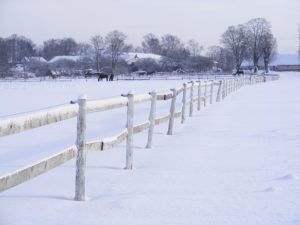
Excessive snow can cause long-lasting winter lawn damage.
There are a few different types of winter damage that lawns may suffer during the winter. You may not even be aware of this damage until the ground thaws and snow disappears in spring. Problems like snow mold, voles, crown hydration, and winter desiccation are all risks for lawns. However, there are steps you can take to avoid or prevent these problems from occurring. Read on to learn about what these problems are and how to address them.
Snow Mold
When snow piles up on a lawn, it can prevent the soil from freezing and increase the turf’s humidity. The grass becomes matted and wet, which encourages snow mold growth. When the snow melts, snow mold will appear as six-to-eight inch patches of water-soaked turf. They may be covered in fluffy white, gray, or pink mold.
To avoid this winter lawn damage:
- Perform appropriate fall lawn care before the snow arrives.
- Rake leaves and debris away and use high nitrogen fertilizers.
- Mow your lawn a bit shorter at the end of the fall to prevent matting. You may also benefit from core aeration, which will dethatch the yard and benefit air circulation.
- You can also apply a preventative fungicide application to help reduce the formation of snow mold.
Voles
This pest can cause a lot of problems. In the winter, voles can travel through the grass under the snow. When the snow melts, you will notice the long runways they create through your grass. Hungry voles feed on the grass, but they don’t feed on the crown, so your grass should be able to recover.
You can reduce the chance of a vole infestation by mowing your lawn shorter than usual at the end of fall. This creates less cover for them during the winter.
Crown Hydration
Crown hydration can be a devastating form of winter lawn damage. This damage occurs when the winter weather warms up briefly before freezing temperatures return. When the weather warms up, grass “wakes up” and starts taking in water. The onset of freezing temperatures then freezes the water inside the grass. This quick-freeze causes water to crystalize in the crown, which ruptures and kills the crown.
Because crown hydration depends on the weather, you cannot prevent or avoid it. When the snow melts in the spring, and warm weather officially returns, assess the damage to see what repair needs are required.
Winter Desiccation
Winter desiccation can happen when there is no snow cover to protect grass from winter’s cold and dry winds. Winter winds and freezing temperatures remove the moisture from the grass, causing damage and death.
Winter desiccation is nearly impossible to prevent. You can put up a windscreen around exposed areas to help, but snow cover is the best way to insulate your grass.
Scientific Plant Service Is Your Go-To Source In Landscape Healthcare
Scientific Plant Service, located in Baltimore, is a privately owned corporation, chartered in Maryland in 1957 by Frank J. Burke. We started as full-service Arborists specializing in the care of shade trees and ornamental shrubs, but today we are a Lawn Care company that is a huge part of the community. From aquatic environments and snow management to deer and mole control, SPS has services tailored specifically for your lawn and landscape.
We offer services in Maryland, Washington, DC, and Virginia, including Harford, Baltimore, Carroll, Frederick, Howard, Anne Arundel, Montgomery, Prince Georges, Talbot, Queen Anne’s, Calvert counties in MD, as well as Loudoun County, Fairfax County, Arlington, Alexandria, and Falls Church in VA. For more information, contact us online, or call us at 410-321-0970. Be sure to follow us on Facebook, Twitter, LinkedIn, and Pinterest!

